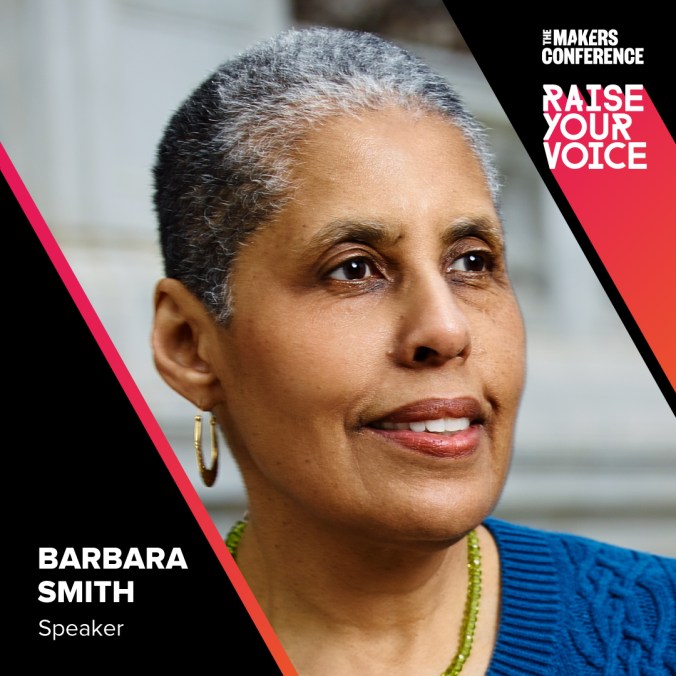

“Barbara Smith always walked the talk, standing up for all those in struggle, no matter their race or nationality, gender or sexuality, consistently fighting from a standpoint of ‘antiracist, feminist, practice with a radical, anticapitalist analysis.’ This is the definition of a revolutionary. And if we are serious about achieving real justice and a lasting peace, we need more revolutionaries like Barbara Smith.”
Robin D. G. Kelley (Foreword, Ain’t Gonna Let Nobody Turn Me Around, p. xxi)

![]()
Brooklyn College, City University of New York – with virtual attendance available
March 13-20, 2023
- Brooklyn College President Welcomes 2022-23 Hess Scholar-in-Residence Barbara Smith
Monday March 13th, 11:00 AM to 12:15
Tanger Auditorium, Brooklyn College Library (also on Zoom) - “If Black women were free…”: the State of Black Feminism 2023
Monday March 13th, 2:15 to 3:30 PM
Tanger Auditorium, Brooklyn College Library (also on Zoom) - Transforming the US Academy
Tuesday March 14th, 2:15 to 3:45 PM
Tanger Auditorium (live streamed on the Wolfe Institute’s YouTube Channel) - Justice or Just Us?: Defining a Queer Agenda
Wednesday March 15th 11:00 AM to 12:30 PM
Tanger Auditorium (live streamed on the Wolfe Institute’s YouTube Channel) - Teaching as a Liberating Practice
Wednesday March 15th, 3:40 to 4:55 PM
Tanger Auditorium (live streamed on the Wolfe Institute’s YouTube Channel) - Working for Liberation and Having a Damn Good Time
Thursday March 16th, 11:00 AM to 12:30 PM
Tanger Auditorium (live streamed on the Wolfe Institute’s YouTube Channel) - Putting Class Back into Intersectionality
Monday March 20th, 6:00 to 7:15 PM
Online via Zoom
The ‘Creative Chaos’ of Gloria Richardson (1922-2021) – The Nation
July 23, 2021
The civil rights activist was a militant advocate for her community as well as a canny strategist.
Barbara Smith: the U.S. “Functions with White Supremacy as It’s Engine.” Here’s How We Dismantle It. – Democracy Now! The Quarantine Report with Amy Goodman
September 11, 2020
#HamerBakerPlan #EndWhiteSupremacy
Since the police killing of George Floyd in May sparked a nationwide uprising against police brutality, armed white supremacists have taken to the streets of U.S. cities in response to Black Lives Matter protests. Organizing against systemic racism has been met with apparent attempts by the Trump administration to cover up white supremacist violence. We speak to legendary Black feminist scholar Barbara Smith, founder of the Combahee River Collective, about her proposal for an antiracist program called the Hamer-Baker Plan — named for Fannie Lou Hamer and Ella Baker — to eradicate white supremacy in the U.S. “I’m not just talking about white supremacist groups or organized white supremacy,” Smith says. “What I’m talking about is a system that actually dictates and shapes every aspect of life in the U.S.”
How to Dismantle White Supremacy
Barbara Smith in The Nation
August 31, 2020
#HamerBakerPlan #EndWhiteSupremacy
“To end systemic racism, the country needs a comprehensive racial justice program even more sweeping than the Marshall Plan. . . . The Hamer-Baker Plan would not only maximize the effectiveness of existing initiatives, but would also function as a catalyst for imagining new ways to challenge systemic racism.”
August 25, 2020
#HamerBakerPlan #EndWhiteSupremacy
The Women’s March Feminist Future Series – Feminism Beyond White Supremacy: Where We Have Been and Where We Need to Go
Panelists: Barbara Smith, Amy Sonnie
Moderator: Caitlin Breedlove, Chief Strategy Officer, Women’s March
July 30, 2020
The session covers a brief history of how white people became white, and the various roles white women have played in upholding white supremacy through the lens of white feminism. It also explores the ways in which it has diverged from Black feminist practice. Then, it delves into ‘bright spot’ moments of feminist organizing in resistance to white supremacy. It lifts up the Combahee River Collective Statement, and also achievements in white women organizing other white women, particularly poor women, Southern organizing, Jewish organizing, and LGTBQ+ organizing.
Until Black Women are Free, None of Us Will Be Free – Barbara Smith and the Black Feminist Visionaries of the Combahee River Collective
Keeanga-Yamahtta Taylor in The New Yorker
July 20, 2020
“Most important, the C.R.C. saw themselves as socialists and as part of the broader left, but they understood that no mass movement for socialism could be organized without responding to the particular forms of oppression experienced by Black women, Chicana women, lesbians, single mothers, and so many other groups. Their point was a simple one: you cannot expect people to join your movement by telling them to put their particular issues on hold for the sake of some ill-defined ‘unity’ at a later date. Solidarity was the bridge by which different groups of people could connect on the basis of mutual understanding, respect, and the the old socialist edict that an injury to one was an injury to all.”
Barbara Smith and Renée Graham in Conversation – The Boston Globe Op-Talks – The Problem is White Supremecy
July 20, 2020
Opinion columnist Renée Graham and Barbara Smith, a renowned Black feminist and lesbian activist and author, discuss her recent Globe op-ed, “The problem is white supremacy.” As this nation again reckons with its history of anti-Black violence and disenfranchisement, Smith strongly believes systemic racism can’t be dismantled so long as “the system of white supremacy that spawns the terrorism remains intact.”
Barbara Smith in the Boston Globe – The Problem is White Supremacy
June 30, 2020
‘Systemic racism’ conveys the pervasiveness of racial oppression, but white supremacy goes further by indicating that there is a rigid nexus of power that protects and enforces it.
“What if there were informational campaigns to develop shared understandings about the ways white supremacy infiltrates every facet of life in the United States: policing, courts, prisons, health care, education, housing, the economy, the environment, religion, science, technology, the arts, sports, and more. Minneapolis City Councilor Andrea Jenkins has called for racism to be declared a public health emergency. What if there were public service announcements, like those we have seen during the pandemic, that provided data, cultural resources, and historical context about the many dimensions of systemic white supremacy as well as steps for challenging it?
What if we launched an initiative on the scale of the Marshall Plan or the space race to eradicate white supremacy? What if it were led by experts with the most detailed knowledge of how white supremacy, in tandem with racial capitalism, operates — that is, poor and working-class people of color? What if these experts partnered with researchers, advocates, and practitioners to provide exhaustive documentation, analysis, and comprehensive recommendations for ending the scourge of white supremacy once and for all? What if . . . ?”
We Who Believe in Freedom Cannot Rest: A Radical Commencement Discussion with Naomi Jaffe and Barbara Smith
May 28, 2020
View the recording of We Who Believe in Freedome Cannot Rest.
Hosted by Students Organizing Mutual Aid and Defense: A radical commencement address and discussion with lifelong activists Naomi Jaffe, who organized as a student in the late 1960s as a part of Students for a Democratic Society (SDS) and the Weather Underground, and now works with Capital Area Against Mass Incarceration (CAAMI), and Barbara Smith, co-founder of the Combahee River Collective and Kitchen Table: Women of Color Press. An interactive conversation with story-telling from Naomi and Barbara about how global political contexts as well as personal circumstances and choices have shaped their trajectories as activists, and an extended 30 minute participant discussion moderated by Sarah Fadem (they/them), who works with the Bennington College Student Union, about graduating college, and fighting for a lifetime.
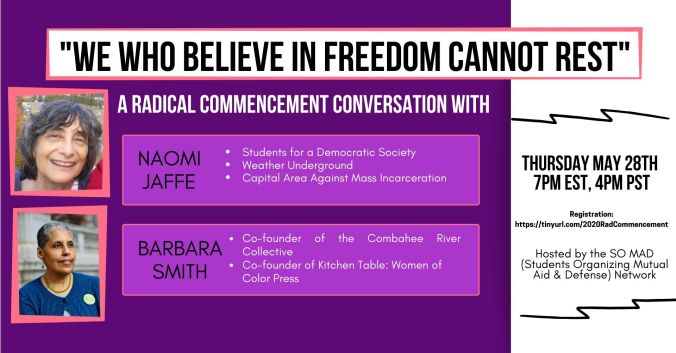
Barbara Smith in the New York Times: Why I Left the Mainstream Queer Rights Movement
June 19, 2019
“Unless we eradicate the systemic oppressions that undermine the lives of the majority of L.G.B.T.Q. people, we will never achieve queer liberation.”

Capital Region Launch of the Poor People’s Campaign
January 29, 2018
Tanya Grant, Organizer 1199 SEIU, and Barbara Smith at the Capital Region Launch of the Poor People’s Campaign, January 29, 2018. Nearly 300 people participated!
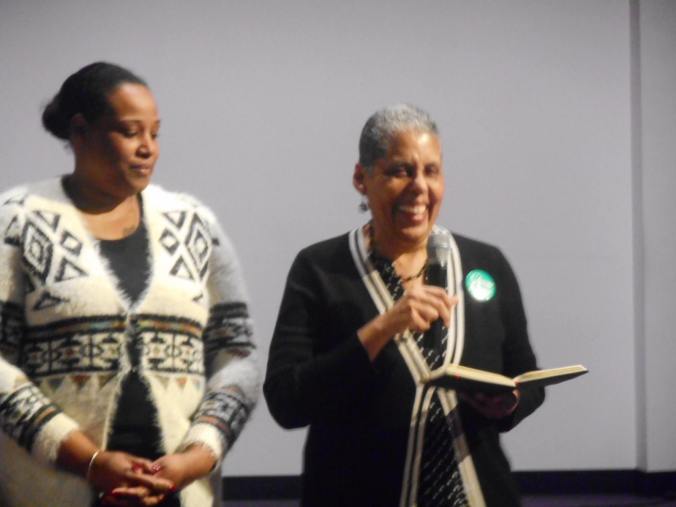
National Women’s Studies Association 2017 Annual Conference
Forty Years After Combahee: Feminist Scholars and Activists Engage the Movement for Black Lives
November 16-19, 2017
Baltimore, MD
This intergenerational panel brings together some of the original members of the Combahee River Collective, including CRC statement co-author Barbara Smith, along with leaders of the Movement for Black Lives and #Sayhername, to talk about the history of Black feminist organizing and the impact of the Combahee River Collective statement on Black feminist praxis today.
Listen to a recording of the discussion.
Read the transcript.

Message from Barbara Smith
Some of you may have wondered why you no longer hear me on WAMC’s Roundtable on Friday. In June I decided that it was no longer viable for me to continue to be a panelist. From the time I began doing the show in early 2015 I wanted to help increase the panel’s diversity, especially bringing in the voices of more people of color. I raised this concern in 2015 and at that time suggested a person who is a highly qualified media professional. In November of 2016 I recommended four more individuals who are members of the Latino/a, Trans, Muslim, and Black communities. In May of this year a regular panelist left the show making available five open slots. Several white panelists were added during this period but none of the individuals I had recommended. I have never willingly supported tokenism or racial segregation. As a matter of principle I decided to leave. I very much enjoyed being on the Roundtable and having the opportunity to speak out in a highly public forum about important issues and events, but I could not continue to do so in opposition to my values.
Barbara Smith, August 12, 2017
Say Her Name: 20 Years of Black Feminism in Action – June 10, 2017
Lerner Hall
2920 Broadway
New York, NY 10027
The African American Policy Forum is pleased to announce that Scholar, Activist and Titan of Black Feminism, Barbara Smith, will receive the Harriet Tubman Lifetime Achievement Award in recognition of her exemplary work in Intersectional Social Justice. Join us in honoring Barbara Smith on Saturday June 10th for Say Her Name: 20 Years of Intersectionality in Action as we celebrate two decades of intersectional research and activism at the African American Policy Forum.

International Day of Action @march8strike
Barbara Smith is among the organizers of the March 8, 2017 International Women’s Strike. The International Women’s Strike is an international day of action planned and organized by women in more than 30 different countries.
In the spirit of solidarity and internationalism, in the United States March 8th will be a day of action organized by and for women who have been marginalized and silenced by decades of neoliberalism directed towards working women, women of color, Native women, disabled women, immigrant women, Muslim women, lesbian, queer and trans women.
March 8th will be the beginning of a new international feminist movement that organizes resistance not just against Trump and his misogynist policies, but also against the conditions that produced Trump, namely the decades long economic inequality, racial and sexual violence, and imperial wars abroad.
More information is available at https://www.womenstrikeus.org/
Read Barbara’s column “As a Black Woman, Here’s Why I’m Striking on March 8th” posted to The Huffington Post.
Watch Barbara Smith’s Keynote Address and Williams College
Barbara delivered the keynote address at the the Williams College 2017 Claiming Williams event on February 2, 2017. Watch her talk below.
“God Don’t Like Ugly and She’s Not Too Stuck on Pretty Either: Black Feminist Ethical Perspectives for These Times”
Barbara is noted as a reason #WHYWEMARCH in the Women’s March on Washington Guiding Vision
The Women’s March on Washington is a women-led movement bringing together people of all genders, ages, races, cultures, political affiliations and backgrounds in our nation’s capital on January 21, 2017, to affirm our shared humanity and pronounce our bold message of resistance and self-determination.
Recognizing that women have intersecting identities and are therefore impacted by a multitude of social justice and human rights issues, the Women’s March on Washington team has outlined a representative vision for a government that is based on the principles of liberty and justice for all.
View the Women’s March on Washington Guiding Vision and Definition of Principles.
Find out more about the Women’s March on Washington and satellite events around the country.
Together! Combahee River Collective!
On March 25, 2016, the University of Massachusetts-Amherst hosted the first ever Combahee River Collective reunion. A panel titled Inside the Continuum: The Combahee River Collective and Black Feminist Foundations was included as part of Feminist Poetics: Legacies of June Jordan, a symposium celebrating the work of feminist poet, scholar and activist June Jordan, and her legacies in contemporary feminist poetics. The event was live-streamed for a national audience. The Combahee panel begins at 4:13:50 in the embedded video.
Sharing the symposium stage:
Cheryl Clarke, Demita Frazier, Akasha Gloria Hull, Margo Okazawa-Rey, Sharon Page Ritchie, Barbara Smith,
Moderator: Paula Giddings
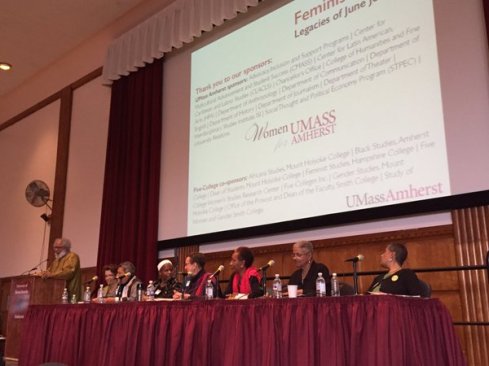
In March 2016, Barbara Smith and Alethia Jones addressed a crowd of 120 students and faculty at Colgate University to discuss sustaining activism.
The students responded with thoughtful considerations of the role that emotions play in fueling positive progress:
“I think Barbara’s point that anger can be used as a metric to determine when one’s personal boundaries have been crossed was a really interesting framing mechanism. Framing emotions in a useful and reflective context is a really important pillar of activism.”
“I really like the attitude these women take towards progress. They discussed the importance of pushing forward even in times where it seems as though no progress is being made. I think it is very easy to get disillusioned and made to feel like nothing is being achieved, but it is going against these ideas that have resulted in change in the past.”
“I found it interesting when Smith mentioned controlling your anger and bitterness and turning it into something positive and profound. She said we should use our anger to strength coalitions and community partnerships.”
Barbara and the outstanding students of Colgate University’s Center for Women’s Studies.
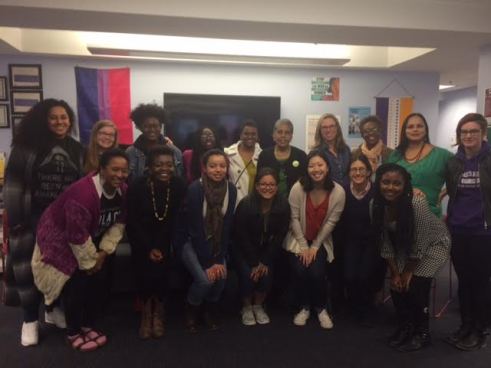
Congratulations! Barbara is honored by the National LGBTQ Task Force with the Susan J. Hyde Award for Longevity in the Movement – January 2016
From the award introduction: “Barbara Smith, an organizer, writer, publisher, scholar-activist, and elected official, dedicates herself to multiple social justice movements, including Civil Rights, feminism, LGBTQ liberation, anti-racism and Black feminism. In four decades of grassroots activism, Barbara has forged collaborations that introduced the concept that oppression must be fought on a variety of fronts simultaneously, including gender, race, class, and sexuality. In 1974, Smith co-founded the Combahee River Collective that produced the Combahee River Collective Statement (1977). Combahee organized around reproductive rights, rape, prison reform, sterilization abuse, violence against women, health care, and racism within the white women’s movement. In 1980, Barbara Smith founded Kitchen Table: Women of Color Press. Kitchen Table published several texts that galvanized feminists of color, such as Home Girls: A Black Feminist Anthology, This Bridge Called My Back, Cuentos: Stories by Latinas, and I Am Your Sister: Black Women Organizing Across Sexualities. Her writings are collected in the anthology The Truth That Never Hurts: Writings on Race, Gender, and Freedom. Her latest book, Ain’t Gonna Let Nobody Turn Me Around: Forty Years of Movement Building with Barbara Smith (SUNY Press, 2014), uniquely combines hard-to-find historical documents with new unpublished interviews with fellow activists and scholars to provide an essential primer for practicing solidarity and resistance. Barbara Smith served two terms on the Albany (NY) Common Council, advocating for youth development, violence prevention, and educational opportunities for poor, minority people.”

Great Local Minds: Barbara Smith
In October 2015, the Times Union showcased Barbara in the Great Local Minds feature, which celebrating members of the Capital District community. Read the full article on the Albany Times Union website.
And the winner is . . .
Ain’t Gonna Let Nobody Turn Me Around has been awarded the 2014 Lambda Literary Award for Lesbian Memoir/Biography. The Lambda Literary Awards identify and celebrate the best lesbian, gay, bisexual and transgender books of the year and affirm that LGBTQ stories are part of the literature of the world. Barbara and members of the book team were honored to be in attendance at the awards ceremony at the Great Hall at Cooper Union in New York City.
Congratulations, Barbara!
For her contributions shaping Black women’s studies and building Black feminism, and for her leadership in practicing an intersectional perspective in the work for justice on all fronts, Barbara Smith received an Honorary Doctorate from University at Albany. She is pictured here with City of Albany Mayor Kathy Sheehan on the day of the ceremony on May 17, 2015.
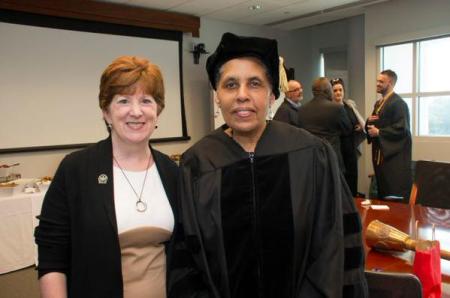
Women of Excellence Award
Barbara Smith has been honored with a Women of Excellence Award for Distinguished Career by the Albany-Colonie Regional Chamber of Commerce and the Women’s Business Council. Honorees joined together at an awards luncheon on May 28, 2015. View a feature about the awards, including profiles of all seven women honored, in the May/June 2015 issue of Capital Region Women@Work Magazine and online through the Albany Times Union website.
![]()
Did you hear?
Women’s Media Center Live with Robin Morgan
Robin Morgan speaks with Barbara Smith about her four decades of activism—and what’s next. [Begins at 33:10]
Joy Reid loves “Ain’t Gonna Let” as much as we do.
“Ain’t Gonna Let Nobody Turn Me Around: Forty Years of Movement Building with Barbara Smith” makes a cameo appearance on Joy Reid’s preview of AM Joy on MSNBC.

Commonwealth Club recording is now available!
In June, Barbara Smith moderated a panel on Black Lives Matter and The LGBTQI Community Forum presented by INFORUM and SF Pride. The panel was a celebration of San Francisco’s LGBT history and a discussion about SF Pride’s theme “For Racial and Economic Justice.”
Catch the live stream!
Black Feminism and the Movement for Black Lives
January 21, 2016
Plenary panel at Creating Change 2016 Conference, National LGBTQ Task Force
Chicago, Illinois
Barbara Smith, Reina Gossett, and Charlene Carruthers
Black Feminism remains a foundational theory and practice guiding social justice movements for Black lives. Black Feminism challenges us to act on the inextricable connections of sexism, class oppression, racism, ableism, homophobia and transphobia. As the contemporary Movement for Black Lives has invigorated resistance to racism and structural violence, this panel reflects on ways that Black Feminism shapes and informs the current struggles and successes.

Barbara Smith is So Popular!
So Popular! with Janet Mock
Janet Mock sits down with one of the women behind America’s black feminist movement to discuss her new book, her decades-long career, and her favorite pop culture obsession, Cookie on FOX’s “Empire.”
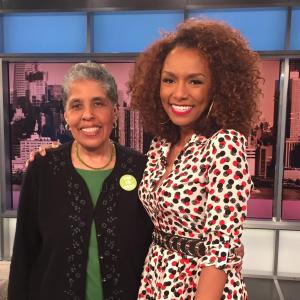
Barbara Smith visits Nerdland!
Melissa Harris Perry Show on MSNBC: What it takes to build a movement
Frances Fox Piven, Vince Warren, Barbara Smith and Carmen Perez talks about what it takes to build a sustainable movement and the role of police in galvanizing the energy of protesters in a movement.

View more footage along with other media appearances on the Ain’t Gonna Let Nobody Turn Me Around Praise and Press page.
![]()
Get a preview of Ain’t Gonna Let Nobody Turn Me Aroudn: Forty Years of Movement Building with Barbara Smith
Download Chapter 1: Chronicling an Activist’s Life from the SUNY Press website or read the press release.
Ain’t Gonna Let Nobody Turn Me Around is formatted as a reflective conversation through four decades of activism. Editors Alethia Jones and Virginia Eubanks worked with Barbara Smith to explore her life from her childhood to her recent work as an elected official in Albany, New York. In a clear, accessible, and conversational style, the book engages readers in fundamental questions that those committed to social justice must grapple with in order to deepen their work and heighten their integrity, accountability, and courage.
• Uses forty years of experience in multiple liberation struggles to shed light on the challenges many current movements continue to face in battling classism, sexism, racism, and homophobia from both outside and within.
• Goes beyond sound bites to delve deeply into the origins and development of key elements of grassroots social justice activism, including coalition building, identity politics, intersectionality, and multi-issue organizing.
• Brings together dozens of significant but hard to find historical documents and new unpublished interviews with Barbara Smith conducted by fellow activists.
